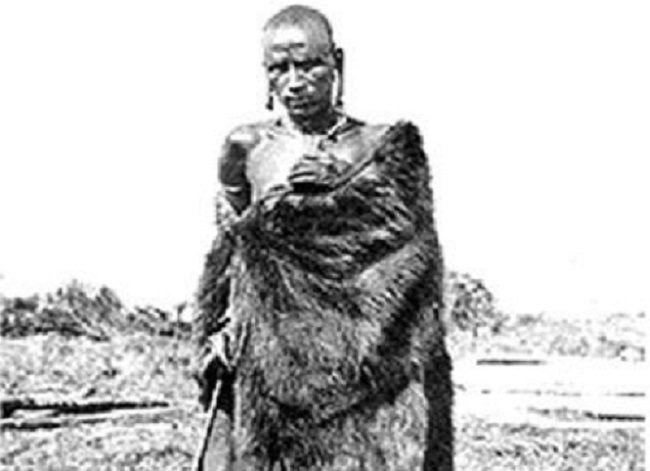He stood in his prime, majestic with an animal skin draped over one shoulder and a stick in his hand. His earlobes stretched from the weight of the metallic traditional earrings he wore. His skin like ebony was outlined by taut muscles underneath. A leader, warrior, and prophet he commanded fear and respect alike. He was Kimnyole Arap Turukat of the Nandi, a powerful kingdom in modern day Kenya.

Photo: Google Arts and Culture
Kimnyole became the fourth Orkoiyot of the Nandi kingdom in the early 1800s, soon after the death of his father Turukat. The Orkoiyot was a spiritual and military leader who was consulted on decisions regarding security, in particular the waging of war. Known for his prophecies, the weight they carried changed the lives of the Nandi. Kimnyole had two prophecies to his name worth noting: the coming of the “white tribe” and “the Iron Snake” (the construction of the Kenya Uganda railway). Often times when he prophesied, measures would be put into place to prepare accordingly. If it were disastrous, preparations would be made to prevent the disaster from occurring, and if it were good the people would prepare for celebrations and thanksgiving.
Under his rule, the Nandi were a formidable force despite many conflicts with the Maasai during the 1870’s and 80’s. As the Maasai fought amongst themselves, the Nandi under Kimnyole’s leadership were keenly watching and waiting to exploit the divisions troubling the Maasai. The Nandi were the wealthiest tribe around, with many cattle and captives from their victories, and self-identified as the superior people in East Africa. In addition to the Maasai, the Nandi people were also successful in getting rid of Arab and Swahili traders from the southern and northern parts of the country. Kimnyole was responsible for bringing great development to the kingdom that was feared and admired throughout East Africa and beyond.
Be as it may, Kimnyole’s reign did not last without trouble. In the late 80’s, a great cattle disease, known as the rinderpest cattle disease, was spreading across East Africa and hit Nandi herds hard killing several cattle and causing hunger in the land. The Nandi largely relied on trading cattle and other livestock, so this served as a terrible loss to their wealth and status. Kimnyole’s people grew bitter towards him for not warning Nandi warriors against capturing infected cattle from their raids. To add insult to injury, only Kimnyole’s cattle survived, increasing growing hostility against him. He was blamed after it was said that he predicted a disaster would strike if his soldiers attacked a neighboring settlement in the hopes of expanding the kingdom, but did nothing to avert it. While the raid was successful, it was from that raid that the soldiers brought the cattle disease with them. In addition, a large number of Nandi warriors were lost when he advised against a joint raid of more warriors.

For the Nandi to rise up against one of their own was unheard of, but Kimnyole stood accused by his people and was sentenced to death for his selfishness and inability to avert the catastrophe as was expected by him. Before his death, Kimnoyle warned his people about the decisions they had made to get rid of him and also warned his people about the unanticipated invasion of the Europeans that would result in the end of the Nandi kingdom. He predicted the coming of the Europeans saying that there would be a coming of a large snake from the eastern lake breathing smoke and fire and going to quench its thirst at the western lake. He also predicted that the snake would continue in a back and forth journey, taking away from the eastern lake and dumping it in the western lake until it had control over the eastern lake. It is said that the snake in Kimnyole’s prophecy was a representation of the Europeans and the travel system one of the slave trade. The smoke and fire were symbolic of the railway and train constructed by the Europeans to help with transportation.
Nevertheless in 1890, Kimnyole was stoned to death because his prophecies had been the source of strife among the Nandi. Some say it was his prophecy that the Nandi would be subdued by the white man that had upset powerful tribal leaders. Others say that Kimnyole had warned his people against these troubles, but they refused to listen. Though his people decided to mercilessly end his reign, they still took heed to his prophecy, and led by his son Koitalel Arap Samoei, who succeeded him, resisted the British Invasion when they arrived in East Africa to establish colonization. He resisted British rule for more than eleven years and later led his people in a rebellion in 1905, now known as the Nandi Resistance. Kimnyole is still known today for his chillingly accurate prophecy that came to pass.
Powered by WPeMatico


